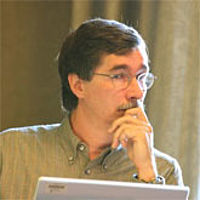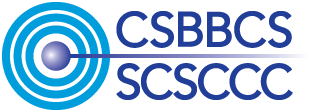2009 Donald O. Hebb Distinguished Contribution Award Winner: Dr. Pierre Jolicœur

A graduate of McGill University (B.Sc.) and Harvard University (Ph.D.) Pierre Jolicœur is world-renowned for his pioneering empirical work and theoretical development in fundamental areas of human experimental psychology. His internationally acclaimed discoveries at the intersection of research on attention, memory, and perception over the last 25 years have profoundly influenced scientific development in each of these areas.
Early in his career, Jolicœur provided the empirical foundations for the study of basic visual routines, using psychophysical and chronometric techniques. He published the seminal papers on curve tracing and on the perception of inside-outside relations. This work established the feasibility of the study of basic visual operations in human observers, and has enabled the study of basic visual routines. Not incidentally, these experiments have paved the way for major later developments in neurophysiological investigations. For example, Lamme and Roelfsema in the Netherlands now study curve tracing at the single-cell level in area V1 of the primate brain.
Jolicœur's research has been just as influential in the field of visual search, wherein observers are required to identify a target object hidden among distractors. Perhaps the principal contribution was the systematic exploration of the principle of “linear separability.” The target object is found easily and quickly if it differs from the distractors on all relevant underlying features. In contrast, a slow and effortful search is required if the features of the target are not linearly separable from the features of the distractors.
More recently, Jolicœur has challenged the claimed effortlessness and automaticity of the processes that encode information into short-term memory. In a series of related articles Jolicœur demonstrated that encoding information into short-term memory requires central processing capacity. He called the process that performs this encoding short-term "consolidation". The importance of this work is that it provides clear-cut demonstrations of the capacity limitations on short-term consolidation and provides the field with effective new techniques for studying these limitations. This aspect of Jolicœur's research provides foundational knowledge toward an understanding of human thought and consciousness.
Never happy to rest on his laurels, Jolicœur's current research programme is energetically incorporating state-of-the-art developments in human electrophysiology, magnetoencephalography, and fMRI, to study heretofore uncharted relationships between spatial selective attention, visual short-term memory, and central attention, at the functional and neural levels. In several recent articles, Jolicœur has used the event-related potential technique with human electrophysiological recordings to show that the attentional blink impairs the deployment of visual spatial attention to visual targets presented in the periphery, and also impairs the transfer of information into visual short-term memory. Other recent work shows that the deployment of spatial attention is also impaired during the psychological refractory period. Just as important, this work shows for the first time that the transfer to visual short-term memory is delayed by concurrent central processing of a cross-modal stimulus. Both sets of findings challenge the widely-held view that spatial attention is independent of central attention. This groundbreaking work constitutes a major advance in our understanding of the brain mechanisms that govern attention and attentional control.
Beyond his many scientific contributions, Jolicœur has contributed significantly to the training of what NSERC refers to as “highly-qualified personnel”, notably graduate students and post-doctoral fellows. Many are now university-based academics with active research projects of their own. Here is a partial list of former graduate students and post-doctoral fellows: Karen Arnell (Brock), Ben Bauer (Trent), Roberto Dell’Acqua (Padova), Peter McCormick (St. Francis Xavier), Bruce Milliken (McMaster), Chris Oriet (Regina), Eyal Reingold (U of T), Eric Richards (U PEI), Biljana Stevanovski (New Brunswick), and Mark Van Selst (San Jose State). But the appointments have not been limited to academia. Two of Jolicœur's former Ph.D. students have worked at the Defense and Civil Institute of Environmental Medicine (Toronto --- now called DRDC - Defense R&D Canada), where they applied the principles discovered in Jolicœur's laboratory. One of them is still doing this work; the other moved to Nortel Networks, where he applied his research skills to the domain of auditory perception in the context of wireless communication systems.
Jolicœur has served the academic community unselfishly in many capacities. He was President of the Canadian Society for Brain, Behaviour, and Cognitive Science, and served on the executive board of the society for 3 years. He has served on the editorial boards of several leading scientific journals. He served on the NSERC Grant Selection Committee for Psychology, and has recently accepted an invitation to serve on the Advisory Council of the International Association for the Study of Attention and Performance. For almost a decade, he served as Associate Editor of the Canadian Journal of Experimental Psychology, the leading Canadian journal for the scientific study of basic mechanisms of perception, cognition, and attention. He is currently Associate Director of CERNEC (Centre de recherche en neuropsychologie et cognition), a dynamic and highly successful research group at the Université de Montréal. As Director of the MEG laboratory at the Université de Montréal, he is facilitating access to this state-of-the-art facility for numerous colleagues and students at the Université of Montréal and at other research institutions in Canada. He has also organized several scientific meetings, including meetings of the Lake Ontario Visionary Establishment conference, the annual meeting of the Société Québécoise pour la Recherche en Psychology (2003), and the meeting of the Canadian Society for Brain, Behaviour, and Cognitive Science, which was held at the Université de Montréal in 2005.
In summary, Pierre Jolicœur is an outstanding scientist whose groundbreaking discoveries have led to widespread national and international recognition. Throughout his career, Jolicœur has also made sustained contributions to scientific training and education. His achievements have recently been recognized by an appointment at the Université de Montréal, as Professeur Titulaire and holder of the Canada Research Chair in Experimental Cognitive Science. He is a Fellow of the Royal Society of Canada. In all respects, he is an outstanding recipient of the BBCS Hebb Award.

